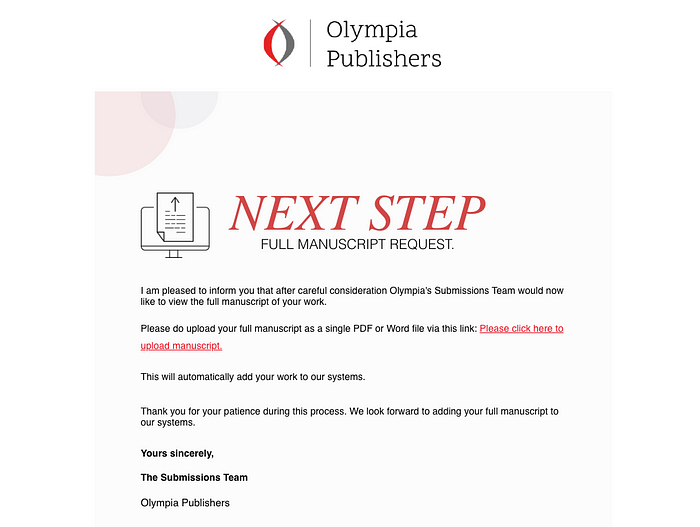
I recently started writing a book, and like many authors, I wanted to gauge the publishing landscape to see if any publishers would take a chance on my work.
In my search, I reached out to Olympia Publishers, a UK-based company that claims to have quite a successful track record.
After submitting my draft, I received the email you see above.
If you’re reading this, chances are you’ve received a similar one, haven’t you?
Before diving into the details, let me share my story with you:
Getting published involves overcoming a few key obstacles.
First, your query letter needs to grab the attention of a publisher or agent. That’s the first hurdle.
If they’re interested, they’ll ask for a synopsis and sample chapters, and if they’re impressed, they’ll request the full manuscript.
That’s what had us feeling so thrilled.
“It looks promising!” my partner remarked, after we browsed the publisher’s website and checked out their book covers, which all looked quite professional.
That publisher was Olympia Publishers, based in the U.K.
At one point, I thought, “Hey, some of the best writers are from the U.K.! Maybe I’m on the right path.”
I glanced at my bookshelf, pulling out titles like Pride and Prejudice and The Hobbit, thinking, the British really know good literature.
A quick look into Olympia Publishers revealed that they were a smaller press, which did raise a few concerns.
But I reassured myself, “They’re taking a chance on a new author, so why not give them a shot?”
Perhaps I could even help elevate their name, I thought. After all, big publishers like Random House often play it safe, while smaller presses are more open to unique voices.
My book, Echoes of Valeria, isn’t your typical fantasy novel, so I needed someone willing to take a risk.
But before I sent them my manuscript, I decided to dig a little deeper.
These days, scams aren’t the obvious “too good to be true” schemes we once imagined.
Modern scammers are more subtle. They don’t outright trick you into sending money for nothing; instead, they play on your hopes.
I had encountered something similar in 2010 with a self-publishing company.
The print quality of their books was excellent, but they marketed themselves with lines like, “Write your success story!”
They implied that anyone could achieve fame and fortune, but in reality, no one ever had.
Sure, it could happen, but the chances were so slim, it felt deceptive.
Olympia Publishers isn’t doing anything illegal, but they belong to a more questionable category.
At least self-publishing companies are upfront about what they offer.
Small presses like Olympia pretend to be traditional publishers, but they work in reverse.
After receiving your manuscript, they don’t outright reject you. Instead, they present a second option: the infamous pay-to-publish deal.
After some research, I found countless writers who had been given the same offer — promised publication, only to be asked to cover fees of up to £3500!
With the rise of free e-books and self-publishing platforms, it’s no wonder small presses struggle to stay afloat.
I wouldn’t be surprised if some had started with good intentions, only to realise that the traditional publishing model wasn’t viable for them.
Faced with eager authors and a dwindling reader base, they likely found it easier to make money from writers instead of readers.
It’s all about supply and demand, and in this case, the demand for recognition from writers is huge.
Still, it’s disheartening to see people profit off of shattered dreams and crushed hopes.
My partner was so upset by the experience that I ended up feeling worse for them than for myself.
But what if we hadn’t found the negative reviews about Olympia Publishers?
What if we had been one of the first to fall for it?
There’s a simple way to check whether a publisher is legitimate — go to Amazon, search for books by publisher, and see how they’re ranked.
Olympia has a fair number of titles listed, so they aren’t a total scam, but none of their books rank anywhere near the top.
If you’re fine with your book being ranked in the millions, then go ahead.
But I don’t want that for something I’ve poured years of my life into. In fact, some of their books are ranked lower than my own self-published work, The Crimson Dawn, which is doing slightly better!
It’s quite a situation when a self-published book outsells a supposedly “legitimately” published one.
There’s more disappointment in this industry than people realise.
You can spend years writing a book, only to find no one takes it seriously — and on top of that, you have scammers waiting to take advantage.
Still, I can’t stop writing — it’s who I am.
